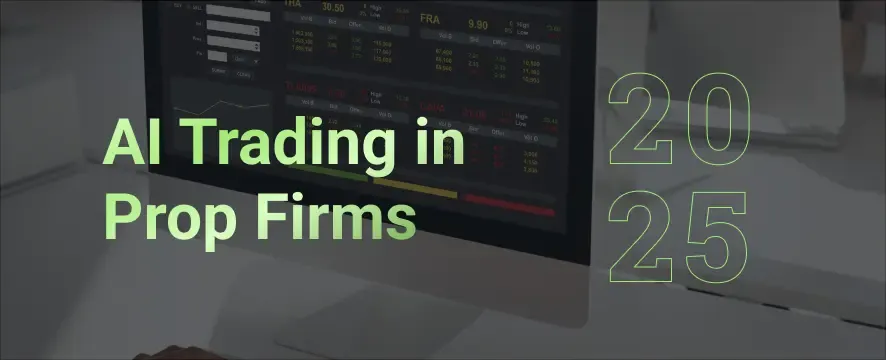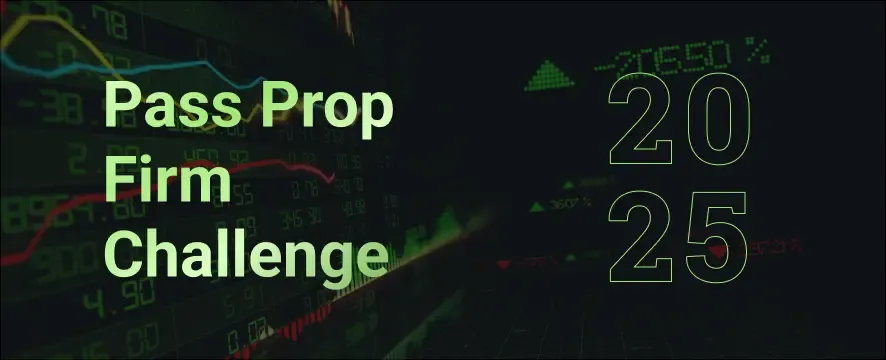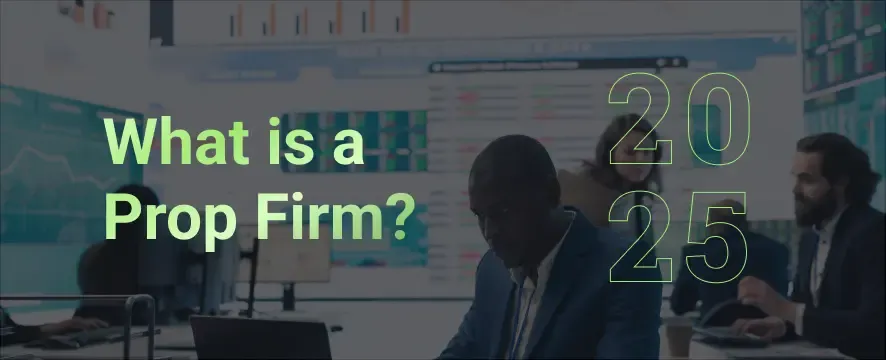
13 min read
How to Be a Funded Trader in 2025
To become a funded trader in 2025, you must pass prop firm challenges by mastering strategy, risk control, and trading rules.
10 min read
Share
A funded trader uses a prop firm’s capital instead of their own. Learn how funded accounts work, profit splits, and how to qualify.

A funded trader is someone who trades the financial markets using a proprietary firm’s capital, rather than their own money. Funded traders split the profits they make with the firm, usually keeping about 70-90% of the profit, and sharing the balance with the prop firm, in exchange for access to their capital.
For many would be traders, funded trading can provide an alternative entry into trading, but success depends on skill, discipline, and risk management. Where traders once needed massive amounts of capital, they can potentially access much larger sums of capital—if they pass the prop firm’s evaluation challenges and adhere strictly to their trading rules.
Most funded trading accounts start with an evaluation process, also called an evaluation phase or a trading challenge. During this phase, traders need to prove themselves by successfully completing the requirements to show the firm that they can trade and that the firm should grant them access to their capital to trade with.
However, funded trading is not risk-free. Evaluation fees can be lost, and funded accounts can be closed for rule breaches. Trading always involves the risk of financial loss.
Although certain prop firms differ in how they go about the evaluation process, most firms have two different “phases”.
This is the initial part of your evaluation and the part where you need to show that you can trade effectively, make a profit, and still adhere to reasonable drawdown rules.
The goal of this phase is to verify that phase one was not a “once-off”, and you are able to actually maintain responsible trading behavior. It’s like a “fraud-check” to make sure you didn’t just get lucky in phase one.
As mentioned, the goal is not only to make profit in the markets, but also to demonstrate that you understand how to apply good risk management in your trading.
Having said that, some firms do skip the evaluation phase entirely and offer instant funded accounts that allow you to start trading right away.
Basically, you pay a larger fee to get instant access to the firm’s trading capital, but are also subject to tighter rules, which the firm needs to enforce to make sure they protect their capital and are not reckless.
Much like normal traders, being a successful funded trader is not about “swinging for home runs”; it’s more about finding a trading edge and diligently applying it, all while carefully watching your risk management.
You’ll want to establish a clear daily “plan of action”. This could include watching the news, mapping out zones on a chart, or following other people’s analysis and outlook for the day. Of course, you’ll want a place where you can focus and trade without distractions.
Every funded account comes with rules around risk management. It’s important for firms to protect their capital, and the wiggle room in this regard is usually very tight. If you break drawdown limits, your account could literally be closed down within a day.
Therefore, risk management is the backbone of a successful funded trading career. Successful traders (funded or not) focus less on chasing big wins and more on protecting capital, because that’s ultimately what brings longevity and creates a profitable trading strategy.
The fact that you’re using the firm's capital to trade (when funded) does not mean you can be careless. In fact, the opposite is true—you should be even more diligent to protect the capital than you would if it were your own.
Can funded accounts grow with success? Yes. In fact, scaling is one of the biggest draws of funded trading programs.
If you want to grow your account, you can do so by hitting profit targets, managing risk, and staying consistent. Over time, even relatively small weekly/monthly returns can compound into substantial profits over time. But consistency is key.
Some highly successful funded traders manage multiple funded trading accounts simultaneously. It can be quite a balancing act, and is not recommended for beginner or even novice traders. But the payoffs can obviously be massive.
A trading journal is like a mirror—it shows both strengths and flaws. Recording trades, mistakes, and improvements isn’t glamorous, but it builds accountability. It also helps you stay disciplined and ultimately prove to the firm that you’re capable of managing their capital responsibly.
What do funded traders actually earn? Well, it obviously varies a lot, depending on experience, account size, and consistency—but the earning potential is good, if you can find a trading edge and implement it consistently.
Aspiring traders who just pass their first challenge might bring in $500–$2,000 a month. Intermediate traders with larger accounts could see earnings of $2,000–$10,000. Seasoned traders handling multiple six-figure funded accounts sometimes make $10,000–$50,000+ each month. The spread sounds dramatic, but it reflects how scaling capital transforms small percentage gains into big dollar figures.
Of course, not everyone will hit these numbers, and results will vary depending on your trading ability, risk management, and how you navigate the intricacies of the trading world.
So, what are the actual skills you need to be a successful, consistent funded trader?
There’s lots of aspects to being a successful funded trader, but most of them can be grouped into three main things:
Technical Analysis: The ability to read, analyze and interpret charts and price action
Psychological Discipline: The ability to maintain control over your emotions
A Proven Trading Edge: A specific way of trading that works for you
Much like trading your own capital, you'll want to practice using a demo account first. This will help you build confidence and test and refine your trading plan and style.
You should not use the evaluation phase as a learning phase. Instead, you'll want to approach the evaluation phase with a clear plan of action already in place.
Furthermore, there is a cost to participating in a challenge program, so you're not only risking your time, you're also risking some of your own money, too.
Every funded trader program has its own unique features. Some focus on forex majors, others branch into multiple asset classes. The key is matching the program rules set by your broker, profit targets, and evaluation phases to your trading style. Reviews, firm reputations, and community feedback matter, and skipping due diligence often costs more in the long run.
Traditional prop firms often hired traders to work in-house with the firm’s capital. But modern funded trading programs have flipped the script, letting traders operate remotely while still managing substantial capital from the firm. This flexibility has blurred the line between retail and professional.
Evaluations may sound simple—hit a profit target, maintain good risk management and don’t break the firm's rules. But you need to carefully check the fine print. Some firms impose strict daily limits, while others focus on overall drawdown. Make sure to pick a program that matches your natural trading style, as this makes passing more realistic and sustainable.
The best programs don’t just hand you money and walk away. Many offer mentorship, webinars, or community forums where traders share strategies and feedback. These resources help aspiring traders become skilled traders—and skilled traders are the ones who are better positioned to maintain long-term success.
If you want to get started with Seacrest Funded, the process is fairly simple. You choose the account size that suits you, pay a one-time challenge fee, and begin trading in a demo environment. The challenge is where you prove you can trade profitably while respecting the firm’s rules around drawdowns and risk.
You have the option of a one-step or two-step challenge. The one-step is faster but requires you to hit a bigger profit target. The two-step gives you more breathing room, with lower targets spread across two phases. If you pass the challenge, you’ll move on to a funded account where you keep most of the profits—typically 80%, or up to 90% if you choose the higher split option.
Consistently profitable traders can also qualify for scaling their account. If you hit the firm’s targets and manage risk well over time, your account size can grow quarter by quarter, with the potential to scale up to $1 million in trading capital.
Where is funded trading heading? The industry is still young, but it’s evolving quickly. More firms are opening up new asset classes, from equities to crypto, giving traders fresh ways to prove their skills and subsequently profit from them.
Regulation is tightening as the sector matures. That may mean stricter oversight, but it also brings legitimacy and security—good news for both traders and firms.
Technology continues to reshape the playing field, and advanced platforms and AI-driven analytics are no longer futuristic ideas; they’re becoming the norm.
In summary, the funded trading space has never been more exciting. However, this is not a get-rich-quick scheme. Success requires time, effort, and discipline. But for traders willing to put in the time and effort, it is a very reasonable path to a sustainable career.
A funded trader account is where a prop firm provides you with trading capital, allowing you to trade their capital, rather than using your own money. However, you are still liable to pay for any evaluation costs.
To qualify for a funded trading account, you usually need to pass an evaluation process or trading challenge that proves your trading skills and risk management.
Potentially, funded traders can earn a full-time income if they are consistent, scale their funded accounts, and follow the prop firm’s trading rules.
Not all funded trading firms require it—some offer instant funded accounts for a higher cost but with stricter trading limits.
Most prop firms let funded traders keep 70–90% of profits, depending on the funded trader program chosen.

13 min read
To become a funded trader in 2025, you must pass prop firm challenges by mastering strategy, risk control, and trading rules.

9 min read
Discover effective AI trading strategies for prop firms to enhance your profits. Learn practical tips to navigate the market successfully. Read more!

8 min read
Instant funding prop firms are becoming increasingly popular, but should you participate?

10 min read
Learn effective strategies to successfully pass a prop firm challenge. Gain insights and tips to enhance your trading skills. Read the article now!

16 min read
Discover the essentials of proprietary trading and learn what a prop firm is. Understand the benefits and risks involved. Read the full guide now!
Get an insight from other users about SeacrestFunded and their experiences. 131K+ members and counting

Get instant access to weekly newsletter.